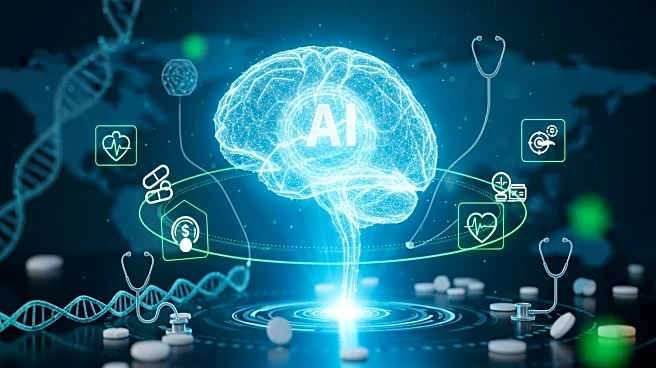What's Happening?
Researchers have developed lightweight language models specifically tailored for oncology tasks, such as named entity recognition, TNM staging, and treatment response prediction. These models integrate instruction tuning, retrieval-augmented generation, and graph-based knowledge integration to enhance their effectiveness in oncology applications. The models are designed to handle complex tasks in clinical settings, addressing the need for scalable and multilingual solutions. The framework incorporates bilingual adaptability, particularly in English and German, to cater to diverse healthcare environments, including resource-limited clinics. This development aims to improve the efficiency and accuracy of data-driven therapy decisions by leveraging real-world data from various clinical sources.
Why It's Important?
The advancement in oncogenomics through specialized language models is significant for the healthcare industry, particularly in oncology. By improving the ability to process and analyze clinical data, these models can enhance decision-making processes, leading to better patient outcomes. The multilingual capability addresses the linguistic diversity in healthcare systems, making these tools accessible to a broader range of institutions. This innovation could reduce the time and resources spent on manual data parsing, thus minimizing errors and inconsistencies in clinical decision-making. The models' efficiency and adaptability make them suitable for deployment in various healthcare settings, potentially transforming oncology practices and improving the quality of care.
What's Next?
The next steps involve further testing and refinement of these models to ensure their reliability and accuracy in real-world clinical settings. Researchers may focus on expanding the multilingual capabilities to include more languages, thereby increasing the models' applicability in global healthcare systems. Additionally, ongoing evaluations will determine the models' effectiveness in diverse tasks beyond oncology, potentially broadening their use in other medical fields. Stakeholders, including healthcare providers and policymakers, may consider integrating these models into existing systems to enhance clinical workflows and patient care.
Beyond the Headlines
The development of these oncology-specialized language models highlights the growing importance of artificial intelligence in healthcare. It raises ethical considerations regarding data privacy and the need for transparent algorithms in clinical decision-making. The integration of AI in healthcare also prompts discussions on the balance between human expertise and machine-driven insights, emphasizing the need for collaborative approaches in medical practice. Long-term, these advancements could lead to shifts in healthcare delivery models, prioritizing data-driven and personalized treatment strategies.










